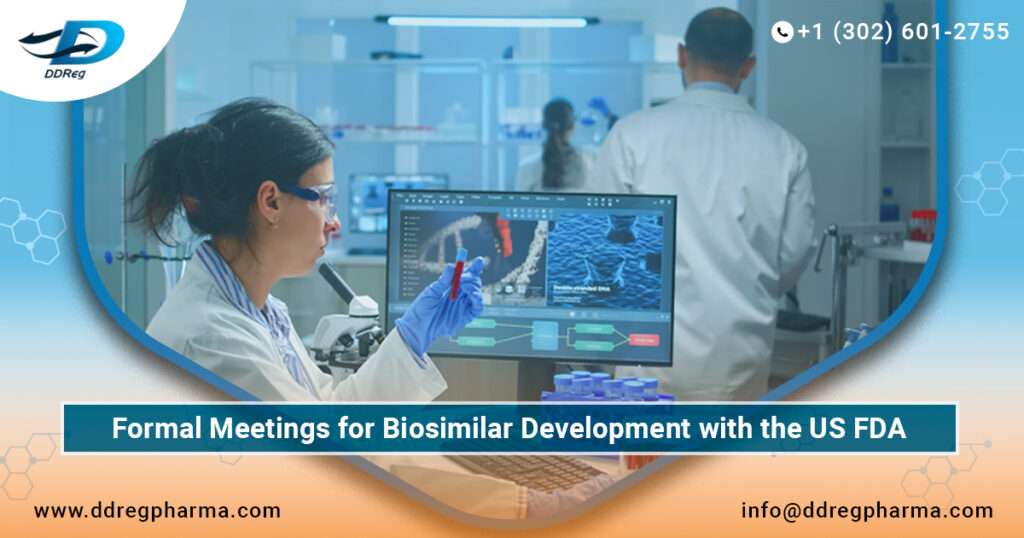Comprehending the Key Components of Formal Meetings for Biosimilar Development with the FDA
Introduction
The development and approval process for biosimilar or interchangeable biosimilar product development is a complex journey. It requires close collaboration between pharmaceutical companies and global regulatory consulting authorities. In the United States, the Food and Drug Administration (FDA) plays a pivotal role in this process. The FDA offers various types of formal meetings for requesters to facilitate effective communication. This ensures that biosimilar product development meet rigorous safety and efficacy standards. These meetings are crucial milestones in the development and review process, each serving specific purposes.
Let’s delve into various types of formal meetings between requesters and FDA staff for biosimilar product development, as well as essential guidelines for requesting them.
Types of Meetings
BIA Meeting (Biosimilarity Initial Assessment): During this meeting, requesters discuss the feasibility of licensure under section 351(k) of the Public Health Service (PHS) Act. The FDA provides general advice on the expected content of the development program related to biosimilarity. Topics covered include preliminary data, reference product identification, indications sought, analytical assessment plans, and various planning aspects.
BPD Type 1 Meeting (Biosimilar Product Development Type 1): This is essential for addressing stalled development programs or addressing critical safety issues. Topics of discussion may include clinical holds, special protocol assessment issues, safety concerns, dispute resolution, and post-action matters. These meetings are crucial for resolving roadblocks and ensuring the smooth progression of the development process.
BPD Type 2a Meeting (Biosimilar Product Development 2a): These meetings are more focused, centering on a narrow set of issues that require input from a limited number of disciplines or review divisions. Requesters may seek advice on immunogenicity testing strategies, updates to study designs, and defined commitments related to Chemistry, Manufacturing, and Controls (CMC) post-approval.
BPD Type 2b Meeting (Biosimilar Product Development 2b): These address specific issues or questions for which the FDA provides targeted advice. While these meetings may involve a substantive review of summary data, they typically do not require full study reports. Discussions during these meetings may encompass topics such as quality attributes, control strategies, study design, and post-approval changes.
BPD Type 3 Meeting (Biosimilar Product Development Type 3): This involves an in-depth data review and advice session for ongoing development programs. This meeting type entails a comprehensive review of full study reports, analytical similarity data, clinical study reports, and FDA advice on biosimilarity. It is a critical step in gaining a thorough understanding of the FDA’s perspective on the product’s development and ensuring alignment with regulatory expectations.
BPD Type 4 Meeting (Biosimilar Product Development Type 4: This serves as a pre-submission meeting aimed at discussing the format and content of a complete original application. During this meeting, the focus is on the planned submission’s format, content, supporting studies, potential review issues, pediatric assessments, and data presentation. It helps requesters ensure that their application aligns with FDA requirements and expectations.
Each of these six meeting types serves a distinct purpose in the biosimilar development and review process. The choice of meeting type depends on the stage of development and the specific advice and guidance needed from the FDA. Additionally, these meetings help foster open communication between requesters and the FDA, contributing to a more efficient and transparent regulatory process.
Guidelines for Requesting a Meeting
Requesting a meeting with the FDA for the development of a biosimilar or interchangeable biosimilar product is a critical step. Some of the key things to consider when requesting a meeting are reviewing publicly available FDA information related to product’s development. This includes applicable guidance documents and regulations. Where possible, applicants should combine related product development issues into as few meetings. This helps in streamlining the process and minimize delays.
Meeting requests should be sent to the division that oversees the reference product, if products have multiple indications. Coordination is essential in such cases. Indeed, meetings may be requested in a non-sequential order. However, for a Type 2a meeting, the applicant must have previously had a BIA or another BPD meeting type with the FDA. It is important to ensure that the meeting type aligns with your development stage and advice needs.
Inevitably, details such as application numbers, product names, reference product information, proposed indications, pediatric study plans. If applicable, human factors engineering plans and combination product information should be included. The type of meeting being requested, it’s format, purpose, and proposed agenda should be included. Ideally, the specific objectives, a list of questions by FDA discipline, and details about planned attendees must also be mentioned.
It is important to clearly define the specific areas of input needed from the FDA in your meeting request. Clarity helps the FDA staff understand the focus and goals of the meeting.
A well-prepared meeting request that includes these components will help the FDA understand and assess the utility and timing of the meeting in relation to product development or review.
Conclusion
Navigating the regulatory landscape for biosimilar and interchangeable biosimilar products requires careful planning, communication, and collaboration with the FDA. Understanding the six types of formal meetings and adhering to the guidelines for requesting these meetings is crucial for success in this complex process. By engaging effectively with the FDA and leveraging these formal meetings, pharmaceutical companies can contribute to advancing access to safe biosimilar treatment options.
References and Further Reading
- US FDA. Formal Meetings Between the FDA and Sponsors or Applicants of BsUFA Products Guidance for Industry. United States Food and Drug Administration. 2023
As a leading regulatory and pharmacovigilance consulting firm, DDReg provides end-to-end support for biosimilar product development and approval. Read our previous blog post on the importance of Paediatric Investigation Plan in Medicine Product Development. Learn more about what the US FDA is doing for a more robust and safe approach towards Enhancing the Safety of Cosmetic Products.

